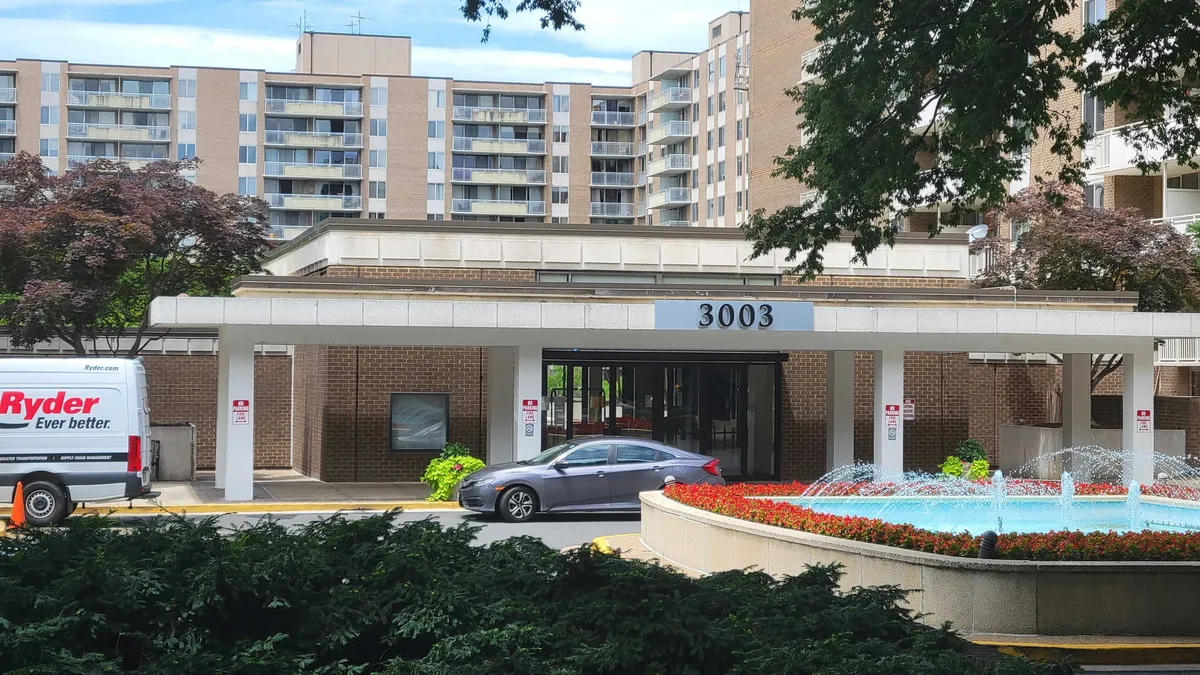Dive Brief:
- Chicago-based multifamily owner and operator Equity Residential must pay a total of $2 million to the District of Columbia and to residents of the 625-unit apartment complex at 3003 Van Ness Street NW for misrepresenting rent costs at the building.
- This settlement concludes a 2017 lawsuit filed by the district’s attorney general that alleged that Equity Residential misled tenants by advertising apartments at 3003 Van Ness for a monthly rent that included an undisclosed concession, then raised the rent at lease renewal based on the actual rent listed on the lease. The District of Columbia Superior Court ruled in October that Equity had violated the district’s Consumer Protection Procedures Act.
- In some cases, tenants’ rents jumped by thousands of dollars per month in the rent-controlled building, according to a press release from District of Columbia Attorney General Karl A. Racine that called the practice a “rent hike scam.” Almost half the penalty — $985,122 — will go to the affected tenants, equivalent to the overcharged amount plus application fees and 2% interest. The rest will go to the district government for litigation costs.
Dive Insight:
In a response to Equity Residential’s motion to reconsider, Superior Court Judge Yvonne Williams specified that the company had engaged in unfair or deceptive trade practices by failing to disclose to prospective tenants that the advertised rent included a monthly discount.
The District of Columbia mandates a maximum yearly rent increase of 2% plus inflation in rent-controlled buildings. While Equity Residential leasing agents told tenants the building was rent controlled, they did not disclose that rent increases would be based on the pre-discount rent. This, according to court documents, “created a net impression in prospective tenants’ mind that tended to mislead them about future rent increases.”
Equity Residential did not return requests for comment from Multifamily Dive. It is the No. 6 multifamily owner and No. 16 multifamily manager in the nation according to the National Multifamily Housing Council, with almost 80,000 units owned and/or operated across the country.
The Van Ness Tenants Association applauded Attorney General Racine for standing up for renters.
“This scam traumatized many of our residents, and he came to the rescue when few others even had the courage to call out this illegal behavior,” said President Harry Gural in the AG’s press release.
Legal implications
Compared to many other jurisdictions in the U.S., Washington’s tenant laws are considered “unusual,” according to Aaron Sokolow, partner at Battino & Sokolow, a Washington law firm specializing in real estate litigation.
Under the District of Columbia’s Rent Control Act of 1985, all rental housing is subject to rent control unless landlords apply for an exemption. Common exemptions include buildings constructed after 1975, which does not cover 3003 Van Ness, which was built in 1970.
“I’m aware of rent control existing in other jurisdictions,” Sokolow said. “But in D.C. specifically, it's so nuanced and so technical that it's almost impossible to navigate, absent legal counsel.”
Sokolow told Multifamily Dive that he has not previously encountered the practice of advertising rent-controlled units at an undisclosed discount and later raising rents based on the base rent, as laid out in the Equity Residential case. “I would certainly have advised any client against it,” he said. “That is not a common practice that I'm aware of.”
The Consumer Protection Procedures Act, the law involved in District of Columbia v. Equity Residential Management, is a portion of the district’s official code that prohibits “a wide variety of deceptive and unconscionable business practices,” according to the website of the Office of the Attorney General. According to Sokolow, landlord and tenant relationships were, at one time, “explicitly carved out” of the CPPA. It has since been amended to include these circumstances.
“It's a tool that the attorney general uses frequently to pursue cases against landlords,” he said, “and it has a lot of teeth.”
After Racine first filed suit against Equity Residential, the district’s rent control law was amended to prevent advertising rent-controlled units at an undisclosed discount and later raising prices based on the maximum rent, according to Sokolow. Under the Rent Charged Definition Clarification Amendment Act of 2018, rent increases at rent-controlled buildings must be calculated based on the amount “a tenant must actually pay.”
The upshot, according to Sokolow, is that rent concessions as they once existed can no longer be applied to rent-controlled buildings in the district.
“I’ve seen lots of landlords and tenants work in concert using rent concessions amicably. It was a very common way to resolve rent control disputes, such as tenant petitions or hardship petitions, and a valuable tool by landlord and tenant attorneys to reach a compromise,” he said. “Now rent concessions are just prohibited, period.”











